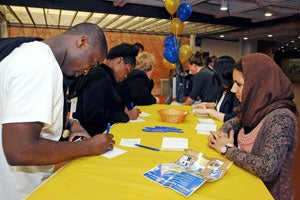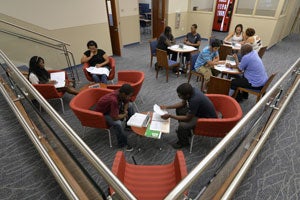Susan Ward
Associate Professor
Communications, Arts & Humanities
Contact Information
Marple901 S. Media Line Road
Media, PA 19063
610-723-2000
Room Number: 2315
Phone: 610-359-5043
Contact Faculty
During my undergraduate years, I earned a degree in Communication Studies and Spanish. I was fortunate enough to study abroad twice during this time and it was during these periods that I became interested in how people interact with one another based on their own cultural experiences. My involvement in speech and debate throughout high school and college added to my interest in studying meaning making between people. I continued my study of communication at West Chester University, earning a master's degree in the field followed by doctoral studies at Regent University with an emphasis in rhetoric and persuasion. I once worked in the technology field, but found my true passion when I began teaching. At DCCC, I teach COMM 100: Interpersonal Communication (online and on-campus), COMM 111: Public Speaking, and COMM 200: Argumentation and Debate.
Degrees
- Ph.D., Communication Studies, Regent University
- M.A., Communication Studies, West Chester University
Papers
- Rhetorically Constructing a ‘Cure’: FDR’s Dynamic Spectacle of Normalcy
- Stigma, Secrets, and the Human Condition: Seeking to Remedy Alienation in PostSecret's Digitally Mediated Environment
- It’s Not the Same Thing: Considering a Path Forward for Teaching Public Speaking Online
- Does Anyone See Me? Playing Host to the Uninvited Guest of Post-Polio Syndrome
- The Norton Field Guide to Speaking
Scholarly Interests
- My dissertation is entitled, "Rhetorically Constructing a ‘Cure’: FDR’s Dynamic Spectacle of Normalcy.” By 1920, America had suffered through the worst outbreak of poliomyelitis that the nation had ever seen. In the summer of 1921, polio left its mark on the Roosevelt family as its patriarch Franklin Delano Roosevelt contracted the disease at the age of 39. FDR was determined to overcome the disease and prove not only to himself, but to the country as a whole, that he could return to political life as an able-bodied individual. Through the use of language, FDR constructed a linguistic “cure” for polio that was based on the symbolic construction that able-bodied was the preference. The work relies upon primary resources to draw important conclusions about how FDR’s dynamic spectacle of normalcy influenced not only the nation’s response to polio but her response to post-polio syndrome.













